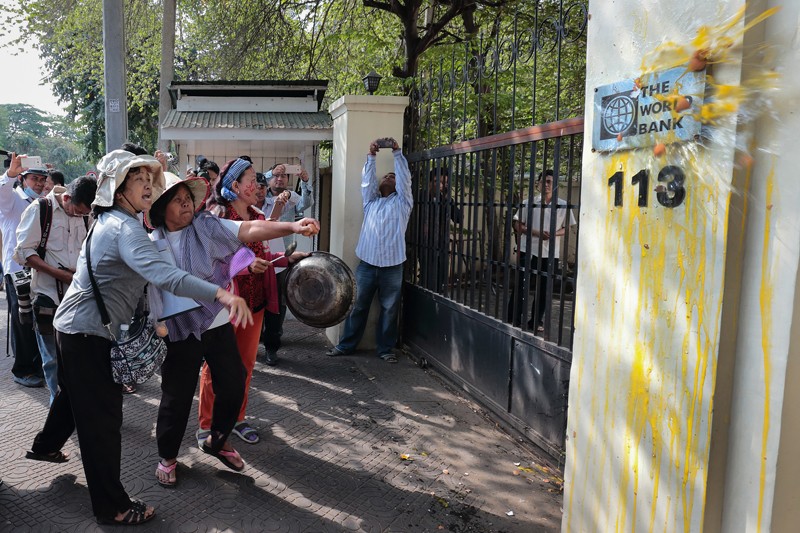The World Bank approved $130 million in new loans to Cambodia late Thursday night, ending a lending freeze that had been in place since 2011 to protest forced evictions by the government.
In a meeting in Washington, the Bank’s board of executive directors approved a Country Engagement Note for Cambodia that called for $130 million in concessional loans across four projects, including $25 million for a second phase of the controversial Land Allocation for Social and Economic Development (Lased) project, according to a Bank press release.

The decision marks a reversal from a lending freeze that had been in place since at least August 2011, when the Bank confirmed it had halted new funds in protest of the Cambodian government’s forced eviction of some 3,000 families from Phnom Penh’s Boeng Kak neighborhood amid a Bank project to grant residents there land titles.
The funding, which will come from the Bank’s International Development Association, includes $30 million in spending to increase health care coverage, $15 million to improve waterways and $60 million in road improvements in addition to the Lased II project.
In the statement, the Bank said it had made the decision to restart funding after “extensive” consultations with stakeholders across Cambodia, including government officials, “local and international civil society, private and business sector, academia, development partners and UN agencies.”
Matthew McGuire, the Bank’s U.S. executive director, abstained from the vote, according to Jocelyn Medallo, director of policy at the International Accountability Project.
“We’ve received updates from the US government that they will be issuing a statement next week” about the decision not vote for the plan, Ms. Medallo wrote in an email. The U.S. government is the Bank’s largest funder.
The U.S. Embassy referred questions to the World Bank’s U.S. headquarters, which was not available for comment at press time.
Naly Pilorge, director of rights group Licadho, called the move “unusual” given recent government arrests of rights workers and opposition leaders.
“That the World Bank would sign on to this agreement with a huge amount of money at this time would almost give the government a green light that it could do anything,” Ms. Pilorge said.
Licadho has been critical of the $13 million first phase of the Lased project, which set up eight social land concessions for thousands of poor families. A 2015 survey by the group found that many families had abandoned their sites because of infertile soil, conflicts over land ownership and promised infrastructure that never materialized.
The World Bank said Lased II would expand to 14 communities.
“Many families have benefited from the project’s predecessor,” it said in the statement.
The statement did not address why the Bank chose this moment to restart lending to Cambodia. Hundreds of former Boeng Kak residents say they have not yet received adequate compensation for their evictions.
“For those who [were] already evicted, they are still waiting for support from the World Bank,” said Eang Vuthy, executive director of land rights group Equitable Cambodia, who called the decision “embarrassing” for the Bank.
“The Bank has to honor its commitment,” he said.
Prominent Boeng Kak activist Tep Vanny said she was “extremely disappointed” with the Bank’s decision. She vowed to protest in front of the World Bank’s office in Phnom Penh this coming week for breaking a promise she said it had made to evictees not to resume funding until they were fully compensated for their losses.
“Unfortunately, it proves to us that the World Bank is not different from the Cambodian government because it always abuses its promises made to affected communities,” Ms. Vanny said. “This Bank just thinks of its personal interests as more important than those of the affected people.”
However, the World Bank said in an email on Friday night that progress had been made in ensuring that families in the area received land titles, spurring the decision to re-engage with Cambodia.
“The large majority of eligible families remaining in the [Boeng Kak] Lake area has now negotiated and received land titles from the Municipality of Phnom Penh (negotiations are ongoing in a few cases), while other eligible former residents chose and have received alternative cash or housing compensation,” the Bank said. “We welcome this progress.”
(Additional reporting by Kuch Naren)




